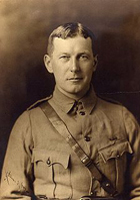The Hope Of My Heart Poem by John McCrae
The Hope Of My Heart
"Delicta juventutis et ignorantius ejus, quoesumus ne memineris, Domine."
I left, to earth, a little maiden fair,
With locks of gold, and eyes that shamed the light;
I prayed that God might have her in His care
And sight.
Earth's love was false; her voice, a siren's song;
(Sweet mother-earth was but a lying name)
The path she showed was but the path of wrong
And shame.
"Cast her not out!" I cry. God's kind words come --
"Her future is with Me, as was her past;
It shall be My good will to bring her home
At last."
The Hope Of My Heart by John McCrae is a poem which reflects social reality and I believe McCraes’s heartfelt hope, that children who suffer an unfortunate life on this earth, will attain a promised heavenly hope. McCrae realizes that despite the best efforts and goodwill of dedicated individuals, the lives of many children will never be happy or prosperous. The poem is a metaphor about life and the fate of many destitute unfortunate and ill children. McCrae never married, but worked as a physician in many hospitals and in private practice. This poem incorporates the fate of many children into the image of one beautiful ‘little maiden fair, /With locks of gold, and eyes that shamed the light; ’ who has been ‘left, to earth, ’ orphaned abandoned ill or in inappropriate guardianship. McCrae completed his medical residency at a children's convalescent home and later worked as a pathologist in a Foundling and Baby Hospital, before studying Infectious Diseases. In stanza one, McCrae prays to God to keep ‘her in His care /And sight.’ This is a prayer for all the suffering children McCrae works with and cares so much for. Stanza two is accurate social reality, ‘(Sweet mother-earth was but a lying name) ’. This personification of earth is false, mother-nature is cruel, ‘her voice, (is) a siren's song; ’ calling many ill children McCrae has as patients to their death. ‘The path she (mother-earth) showed was but the path of wrong /And shame’, is a comment about social injustice, cruelty, exploitation and irresponsibility. In stanza three McCrae cries to God 'Cast her not out! ' and God kindly answers his prayers telling him, that her future past and eternity is with him. McCrae ends his poem with this absolutely beautiful affirmation of faith 'Her future is with Me, as was her past; It shall be My good will to bring her home At last.'
Terse, direct and bring home your theme, thr hope of your heart amen.
" Delicta juventutis et ignorantius ejus, quoesumus ne memineris, Domine."
This poem has not been translated into any other language yet.
I would like to translate this poem
Her future is with me... Thanks for sharing. Sylva